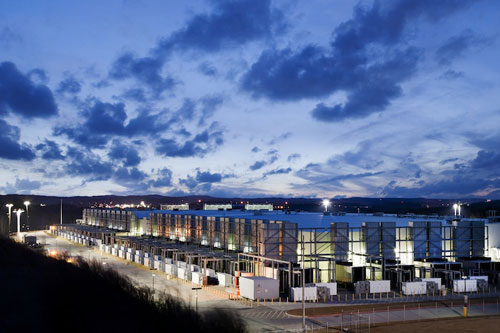
A Google information middle in Douglas County, Georgia.
This text was produced for ProPublica’s Native Reporting Community in partnership with The Seattle Instances. Join Dispatches to get tales like this one as quickly as they’re printed.
When lawmakers in Washington got down to broaden a profitable tax break for the state’s information middle business in 2022, they included what some thought of a necessary provision: a examine of the energy-hungry business’s affect on the state’s electrical grid.
Gov. Jay Inslee vetoed that provision however let the tax break growth go ahead. As The Seattle Instances and ProPublica lately reported, the business has continued to develop and now threatens Washington’s effort to remove carbon emissions from electrical energy era.
Washington’s expertise with addressing the ability demand of knowledge facilities parallels the struggles enjoying out in different states across the nation the place the business has quickly grown and tax breaks are an element.
Virginia, residence to the nation’s largest information middle market, as soon as debated operating information facilities on carbon-emitting diesel turbines throughout energy shortages to maintain the lights on within the space. (That plan confronted vital public pushback from environmental teams, and an space utility is exploring different choices.)
Dominion Power, the utility that serves most of Virginia’s information facilities, has mentioned that it intends to satisfy state necessities to decarbonize the grid by 2045, however that the duty can be more difficult with rising calls for pushed largely by information facilities, Inside Local weather Information reported. The utility additionally has indicated that new pure fuel vegetation will likely be wanted.
Some Virginia lawmakers and the state’s Republican governor have proposed reversing or dramatically altering the clear vitality targets.
A northern Virginia lawmaker as an alternative proposed attaching strings to the state’s information middle tax break. This yr, he launched laws saying information facilities would solely qualify in the event that they maximized vitality effectivity and located renewable sources. The invoice died in Virginia’s Common Meeting. However the state approved a examine of the business and the way tax breaks affect the grid.
“If we’re going to have information facilities, which everyone knows to be large customers of electrical energy, let’s require them to be as environment friendly as attainable,” mentioned state Delegate Richard “Rip” Sullivan Jr., the Democrat who sponsored the unique invoice. “Let’s require them to make use of as little vitality as attainable to do their job.”
Inslee’s 2022 veto of a examine just like Virginia’s cited the truth that Northwest energy planners already embody information facilities of their estimates of regional demand. However supporters of the laws mentioned their purpose was to acquire extra exact solutions about Washington-specific electrical energy wants.
Georgia lawmakers this yr handed a invoice to halt the state’s information middle tax break till information middle energy use could possibly be analyzed. Within the meantime, based on media studies, the state’s largest utility mentioned it could use fossil fuels to make up an vitality shortfall induced partially by information facilities. Georgia Gov. Brian Kemp then vetoed the tax break pause in Might.
Lawmakers in Connecticut and South Carolina have additionally debated insurance policies to deal with information middle energy utilization up to now yr.
“Possibly we need to entice extra of them to return. I simply need to guarantee that we perceive the professionals and the cons of that earlier than we do it,” South Carolina’s Senate Majority Chief Shane Massey mentioned in Might, based on the South Carolina Day by day Gazette.
International locations equivalent to Eire, Singapore, and the Netherlands have at instances compelled information facilities to halt development to restrict strains on the ability grid, based on a report by the nonprofit Tony Blair Institute for International Change. The report’s suggestions for addressing information middle energy utilization embody encouraging the personal sector to take a position straight in renewables.
Sajjad Moazeni, a College of Washington professor who research synthetic intelligence and information middle energy consumption, mentioned states ought to think about electrical energy impacts when formulating information middle laws. Moazeni’s current analysis discovered that in simply in the future, ChatGPT, a preferred synthetic intelligence instrument, used roughly as a lot energy as 33,000 U.S. households use in a yr.
“A coverage may help each push firms to make these information facilities extra environment friendly and protect a cleaner, higher atmosphere for us,” Moazeni mentioned. “Policymakers want to think about a bigger set of metrics on energy utilization and effectivity.”
Eli Sanders contributed analysis whereas a scholar with the Know-how, Legislation and Public Coverage Clinic on the College of Washington College of Legislation.